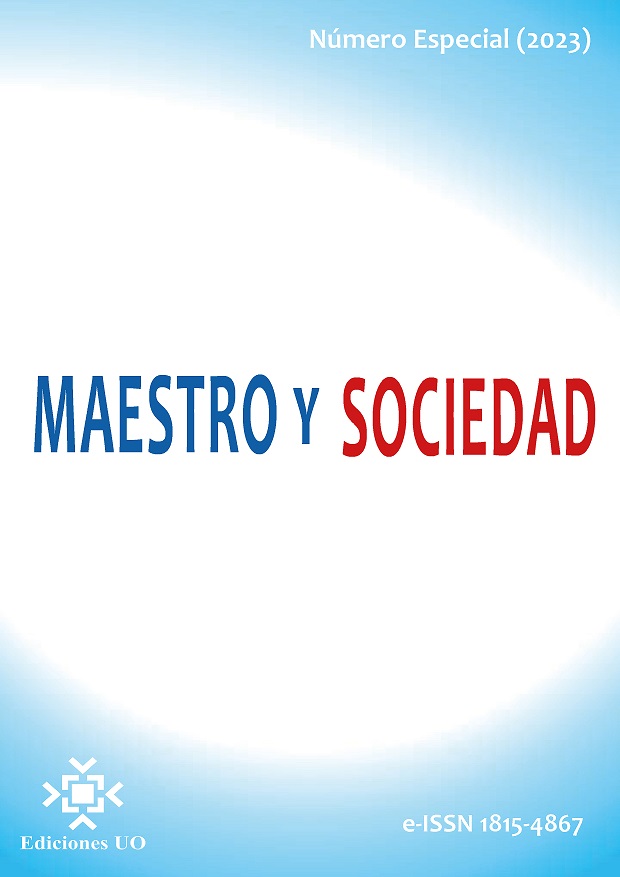The sports practice of chess and its incidence in the community
Keywords:
chess, sports practice, community, sports team, community cultureAbstract
Introduction: With the growing employment of the new technology a marked tendency exists to the disappearance of
the traditional teaching, in what the Physical own Education is included. In Cuba he/she defends that it is the school,
with their more integrative and more sophisticated teaching, the one that will assume with the formative mission of
preparing the man for the life. He/she takes charge of impacting in the community to contribute, from their formative
and recreational spaces, to the development. Objective: To evaluate the impact of the sport practice of the chess in the
community. Materials and Methods: Its takes like base for this study the space of those combined sport as organizational
unit that a pedagogic open model uses and that its propitiates the gradual incorporation of the whole population. This
investigation is aided of the employment of the theoretical and practical methods of the scientific knowledge in the
process of analysis of the study object and its construction. Results and discussion: In the interviews with the children
and members of the families referred all to be interested by the practice of the Chess and some 12 (57%) practice it
in their free time, but without being planned. The causes that impede the development of the recreational activities
physique in the popular advice assure that the little popularization of the program of activities and the causes that
impede their participation are they are the little popularization of the program of activities, the offered activities are not
of their pleasure (21 for 67,7%) and little variety in them. In carried out analysis the wealth of the studies is verified it has more than enough technical elements of the Chess, however, the necessity still persists of developing new investigations
related with the treatment of this game in the communities. Conclusions: It was possible to transform the imaginary of
students and family in connection with the recreational possibilities that offer these practices.
References
Ardila, B, J. N. (2022). Juegos tradicionales: aportes al desarrollo sociocultural en contextos educativos rurales. Revista Digital: Actividad Física y Deporte, 8(1). https://doi.org/10.31910/rdafd.v8.n1.2022.2152
Blanco, U. (2006). ¿Por qué el Ajedrez en las escuelas? Ministerio de Educación Cultura y Deporte de Venezuela.
Díaz Armas, K., Massip Acosta, A.,León Vázquez, L. L. y Rodríguez Verdura, H. (2022). La educación familiar en la iniciación deportiva del ajedrez desde una perspectiva científica e innovadora. Arrancada, 22(42), 36-57.
Fernández, Y. (2020). Propuesta de actividades para la práctica del ajedrez en el entorno comunitario. [Tesis de grado, Universidad de Holguín].
Heredia, G. D. (2012). Modelo de planificación para el perfeccionamiento de la preparación teórico-práctica de los ajedrecistas de alto rendimiento. [Tesis de Doctorado. Universidad de Ciencias de la Cultura Física y el Deporte “Manuel Fajardo”].
INDER. (1991). Sistema Cubano de Cultura Física y Deporte. INDER.
Laffita, Y. (2017). Metodología para la familiarización de los niños del sexto año de vida con el ajedrez desde la educación física. [Tesis Doctoral, Universidad de Matanzas].
Leivas, M., Aritizábal, A. y Mendoza, M. (2017). Del cuerpo a la ciudad: repensando nuestros territorios desde la investigación colectiva con cartorafía social. Kult-Ur, 4(169), 190. https://doi.org/10.6035/Kult-ur.2017.4.8.6
Lescaille, J., Lobaina, D. & Carnet, E. (2021). Influencia del aprendizaje del ajedrez en el pensamiento representativo de niños del grado preescolar. Revista Digital de Educación Física, 71, 29-58.
Menrique, J. (2019). El ajedrez como herramienta pedagógica para la enseñanza de las tablas de multiplicar soportados por recursos informáticos. https://repository.ucc.edu.co/handle/20.500.12494/13058
Moreira Mendoza, C. V., Ramírez Guerra, D. M. & Moreira Vera, V. D. (2022). Actividades físicas deportivas para la masificación del deporte universitario. Didasc@lia: Didáctica y Educación 13(2), 291-306. https://revistas.ult.edu.cu/
index.php/didascalia/article/view/1364
Pachot, K. L. (2007). El derecho al deporte, la constitución y las normas de ordenación del deporte en Cuba. [Tesis de doctorado inédita. Universidad de Oriente].
Paniagua, M. (2017). La influencia del ajedrez en los procesos cognitivos. [Tesis de Maestría, Universidad de Rioja].
Ramírez Guerra, D. M. (2010). Metodología para la masificación del ajedrez en las Comunidades. [Tesis de Maestría. ISCF Manuel Fajardo].
Rodríguez, Á. (2008). El deporte en la construcción del espacio social. Centro de Investigaciones Sociológicas.
Rodríguez Milián, A., Moré Estupiñán, M. & Gutiérrez Pairol, M. (2019). La Educación Física y la educación para la salud en función de la mejora del rendimiento físico de los estudiantes. Universidad y Sociedad, 11(1), 410-415. http://rus.ucf.edu.cu/index.php/rus
Santana-González, Y., Manzano-García, M., Valdés-García, L., Soler-Nariño, O., Bring-Pérez, Y., Hernández-Despaigne, R. & Leonard-Danger, E. (2023). Experiencia del personal de salud frente a la COVID-19 en las zonas rojas de Santiago de Cuba. Revista Cubana de Medicina General Integral, 39(3), e276. https://revmgi.sld.cu/index.php/mgi/article/view/2076
Tey Almaguer, T., Rodríguez Hernández, Z. & Aliaga Petitón, L. (2018). Orientaciones metodológicas para la enseñanza de los finales de partidas de ajedrez. Arrancada 18 (33), 50-57. https://revistarrancada.cujae.edu.cu/index.php/arrancada/article/download/246/184/726
Published
How to Cite
Issue
Section
License
Copyright (c) 2023 Yoel Cervantes Hernández, Yorkys Santana González

This work is licensed under a Creative Commons Attribution-NonCommercial-NoDerivatives 4.0 International License.
This journal provides immediate open access to its content, based on the principle that offering the public free access to research helps a greater global exchange of knowledge. Each author is responsible for the content of each of their articles.



























 Universidad de Oriente
Universidad de Oriente 